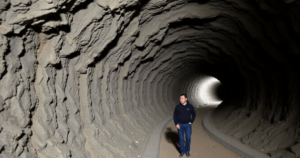Israel’s Controversial $92M Tunnel Plan Sparks Outrage, Restricts Palestinian Access
Israel has approved a tunnel project linking the illegal Ma’ale Adumim settlement with occupied Jerusalem while restricting Palestinian movement. The tunnel, running between Al-Eizariya and Al-Zaim, will cut off key routes connecting Bethlehem and Hebron to Jericho and the rest of the West Bank, further fragmenting Palestinian territories. Initially proposed by Defense Minister Yisrael Katz, the project had been delayed but is now moving forward with segregated roads—one for Israeli settlers and another forcing Palestinians onto less efficient routes.
The $92 million initiative, part of Israel’s “Fabric of Life” road network, is controversially funded in part by fees collected from Palestinians in the West Bank. Israeli media portrays it as a strategic move to cement control over the area while limiting Palestinian territorial claims, aligning with past efforts to seize Khan al-Ahmar. The plan dates back to 2008, when Israel’s High Court delayed it to assess alternative Palestinian routes before approving sections later that year.
Human rights organizations have condemned the project as a violation of international law, arguing it exacerbates Palestinian displacement while reinforcing illegal settlements. The Fourth Geneva Convention explicitly prohibits an occupying power from transferring its population into occupied land, making Israel’s settlement policies and related infrastructure unlawful.

Israel’s Controversial $92M Tunnel Plan Sparks Outrage, Restricts Palestinian Access
The Israeli government has approved a contentious plan to construct a tunnel connecting Ma’ale Adumim, an Israeli settlement deemed illegal under international law, to occupied East Jerusalem. Critics argue that the project will severely restrict Palestinian movement, further dividing Palestinian communities while expanding Israel’s control over the West Bank.
Impact on Palestinian Mobility
The tunnel will run between the Palestinian towns of Al-Eizariya and Al-Zaim, blocking critical roads that connect Bethlehem and Hebron to Jericho and other parts of the West Bank. This move threatens to further fragment Palestinian territories, making travel between cities longer and more difficult. Vital routes used for daily commutes, trade, and access to essential services such as hospitals and schools will be redirected, forcing Palestinians onto alternative, often poorly maintained roads.
Segregated Roads and Funding Controversy
First proposed by Israeli Defense Minister Yisrael Katz, the project includes separate road systems: one for Israeli settlers traveling swiftly between Ma’ale Adumim and Jerusalem, and another for Palestinians forced onto circuitous detours. The initiative falls under Israel’s “Fabric of Life” program, a network of roads designed to serve settlers while bypassing Palestinian areas.
With a budget of 335 million shekels ($92 million), the project has drawn criticism over its funding sources. A significant portion of the money comes from fees collected from Palestinians in the West Bank through the “Civil Administration Supplementary Fund”—a system that rights groups describe as exploitative. Critics highlight the irony of Palestinians effectively financing infrastructure that entrenches their own displacement.
Strategic Expansion and International Law Violations
Israeli media outlets frame the tunnel as a strategic move to solidify control over the Jerusalem area while undermining Palestinian claims to the land. The plan also aligns with long-standing efforts to seize Khan al-Ahmar, a Palestinian village strategically located between Jerusalem and Ma’ale Adumim. Its displacement would sever the geographic continuity of a future Palestinian state, a key objective of Israeli settlement expansion.
Human rights organizations, including Amnesty International and B’Tselem, condemn the project as a violation of international law. The Fourth Geneva Convention prohibits an occupying power from transferring its population into occupied territories or displacing local residents. Israel’s settlement policies, which have expanded dramatically since 1967, are widely viewed as illegal under these laws. The tunnel project further entrenches these settlements, making a two-state solution increasingly unviable.
Historical Context and Legal Battles
Efforts to develop segregated road networks began in 2008 but faced delays due to legal challenges. Israel’s High Court initially paused the project to review alternative routes for Palestinian traffic. Later that year, sections near the Modi’in settlement were approved, connecting Palestinian villages to Ramallah. However, the newly approved tunnel marks a significant escalation, bypassing earlier compromises and directly prioritizing settler mobility over Palestinian rights.
Broader Implications
The tunnel is part of a broader strategy to isolate Palestinian communities while integrating settlements into Israel’s infrastructure. Over 700,000 Israeli settlers now reside in the West Bank and East Jerusalem, in communities fortified by walls, checkpoints, and roads inaccessible to Palestinians. This system has drawn comparisons to apartheid-era segregation, with Palestinians requiring permits to travel even within their own territories.
The international community, including the United Nations and the European Union, has repeatedly condemned settlement expansion as illegal. However, enforcement remains weak, allowing Israel to continue advancing projects like the Ma’ale Adumim tunnel. For Palestinians, restricted movement threatens their livelihoods, family connections, and access to resources, worsening economic hardship and deepening political despair.
Calls for Accountability
Rights groups urge third-party nations to impose consequences for violations of international law, such as sanctions or trade restrictions. They argue that without accountability, Israel’s policies will continue to erode Palestinian rights and any prospects for peace. Meanwhile, Palestinian leaders call for global solidarity to pressure Israel into halting settlement projects and complying with legal obligations.
As construction moves forward, the tunnel stands as a symbol of the stark imbalance of power in the region—prioritizing settler convenience over Palestinian freedom and cementing Israel’s grip on occupied territories. For Palestinians, it represents yet another step toward the irreversible fragmentation of their land and future.
You must be logged in to post a comment.